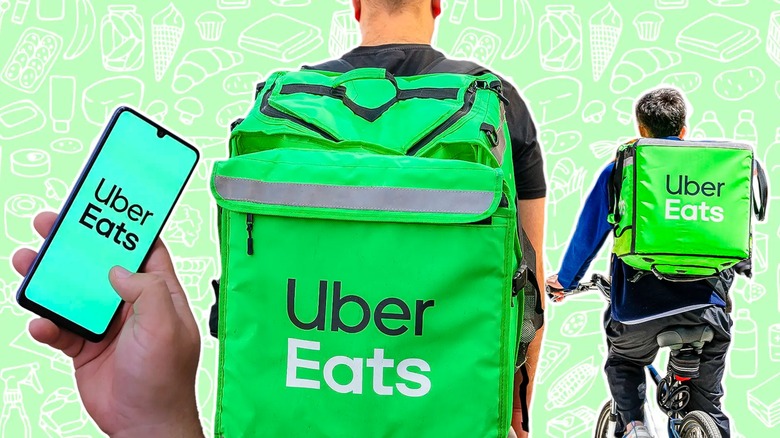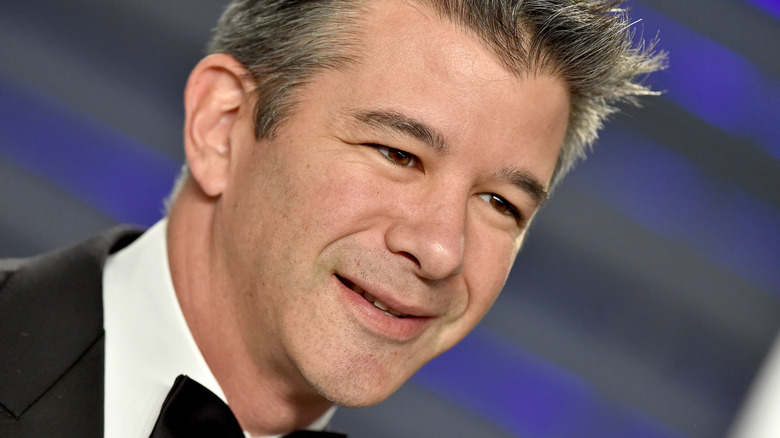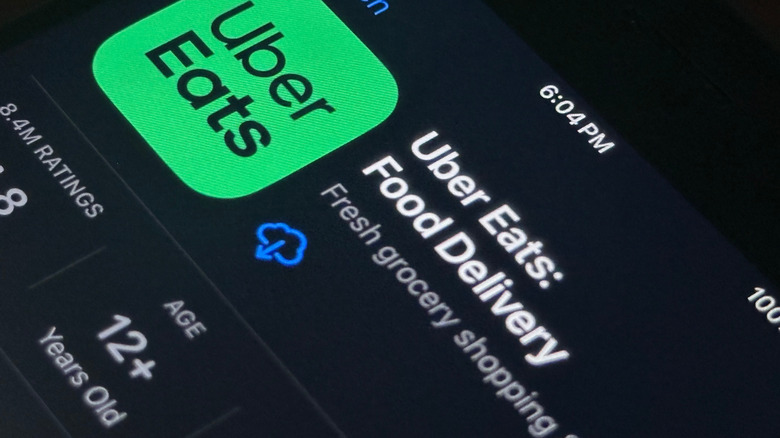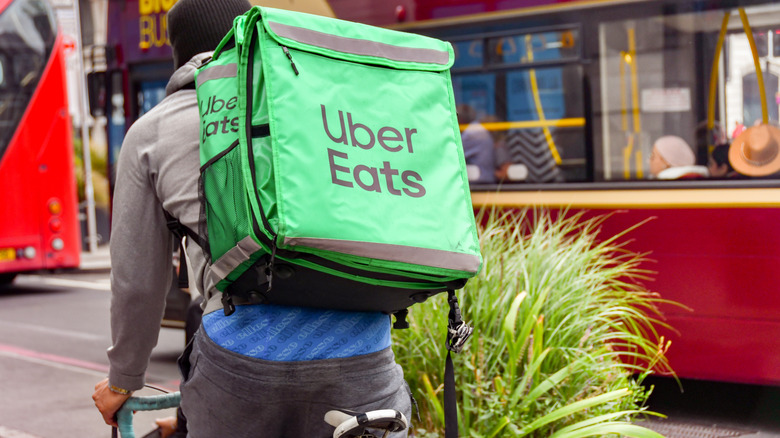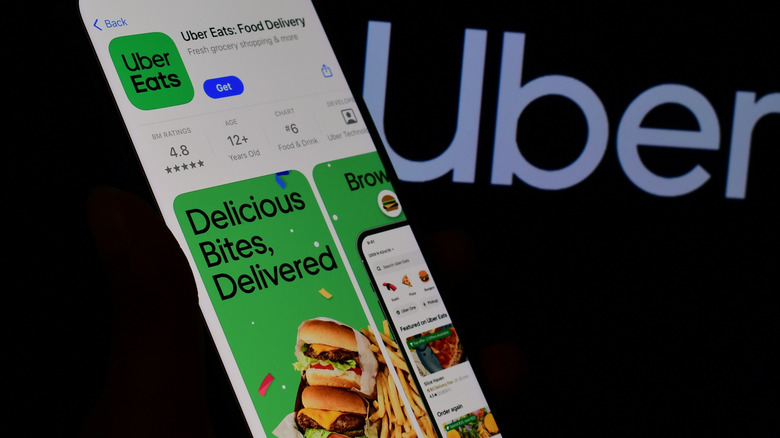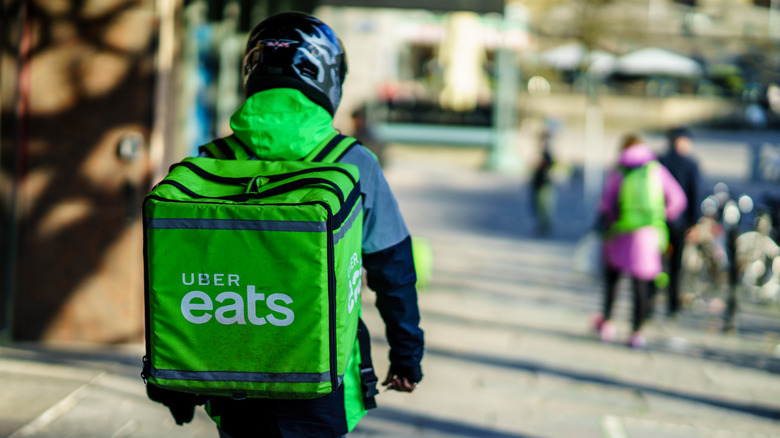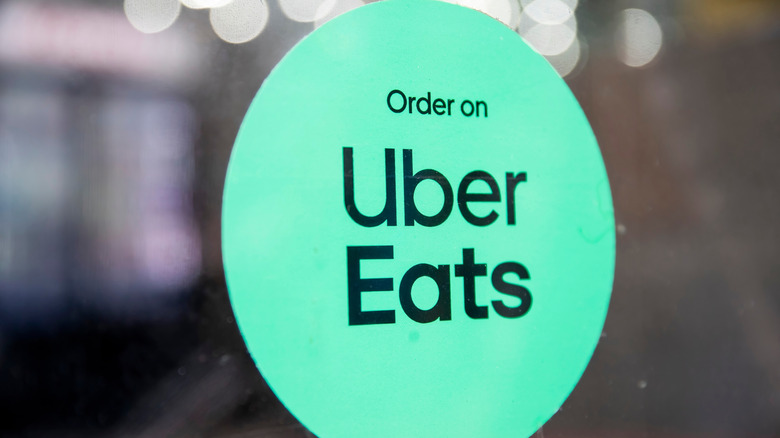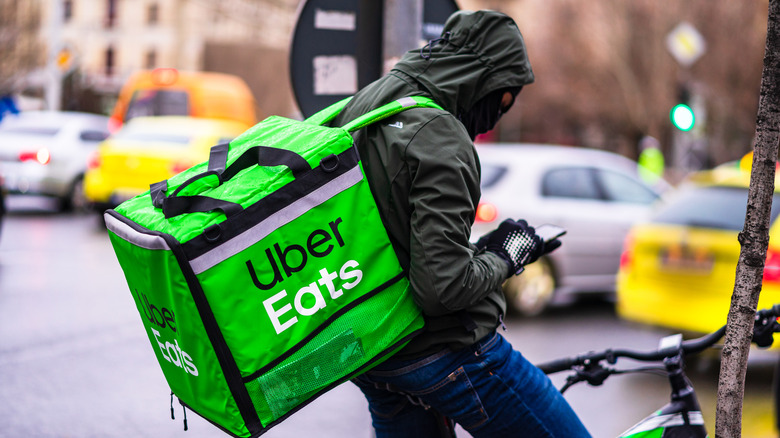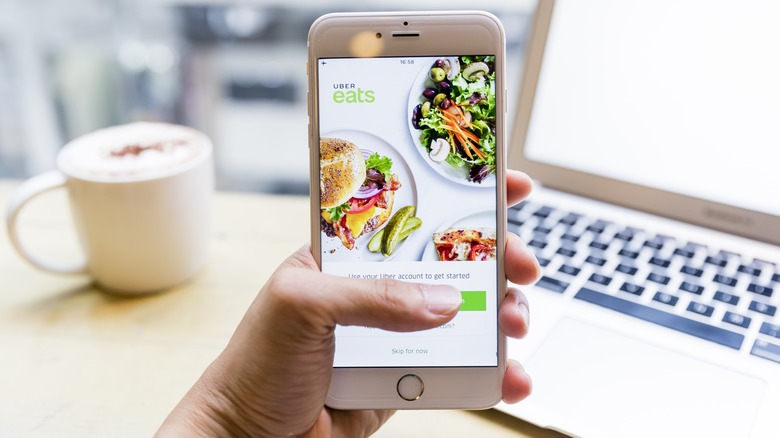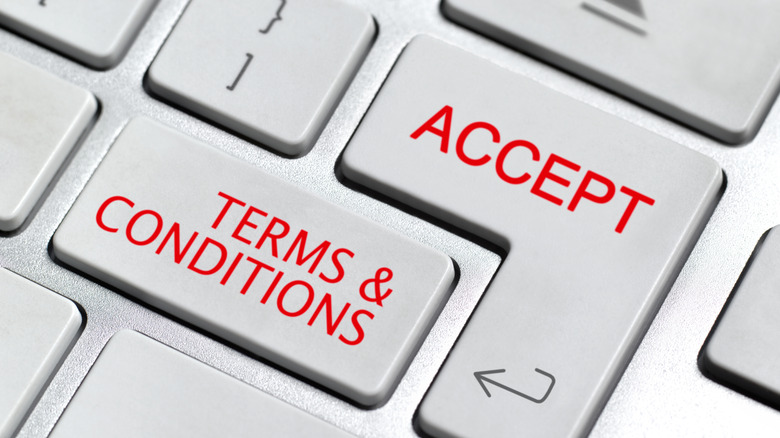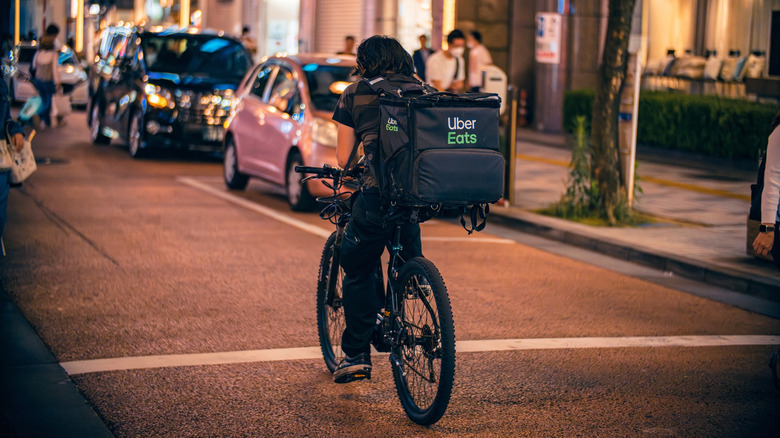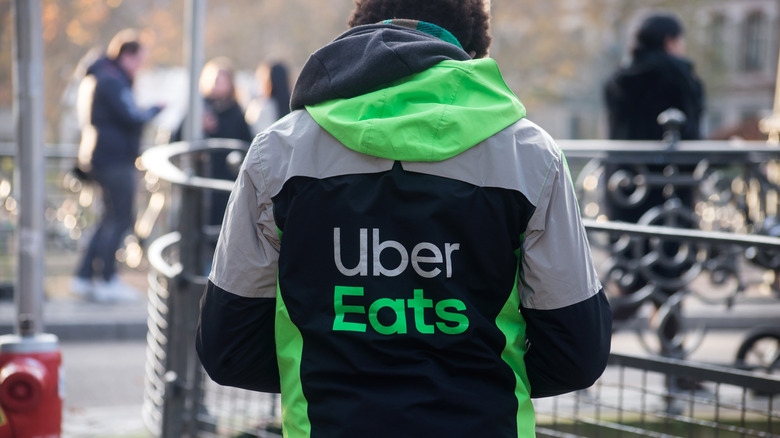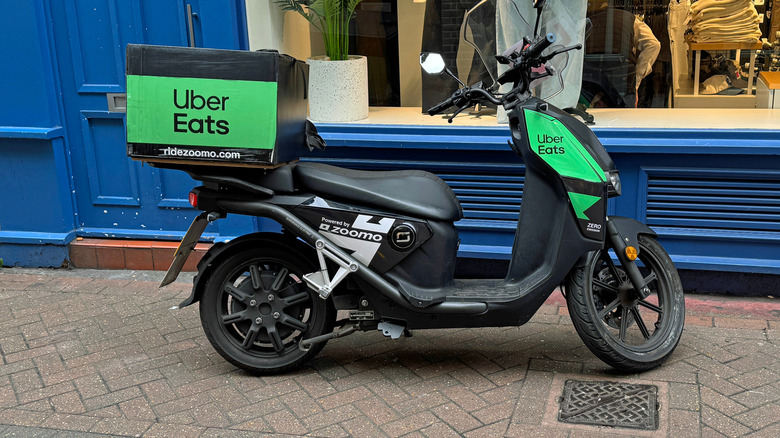12 Controversial Facts You'll Want To Know About Uber Eats
We live in a weird world where someone, somewhere, will find some kind of issue with anything that hits television, theaters, streaming, or social media. No company is immune from being accused of any number of transgressions, and that definitely applies to Uber Eats.
In 2024, Uber Eats aired a commercial during the Super Bowl. It was meant to show some famous people in a humorous light, forgetting things like the names of their bands (Victoria Beckham) and their long-time co-stars (Jennifer Aniston and David Schwimmer). But the commercial also included a questionable addition that wrapped Uber Eats up in a peanut butter-related controversy, and that was someone forgetting they had a potentially deadly allergy before digging into peanut butter.
The company removed that scene from the commercial, but if you do some digging into the history of Uber Eats, you'll find many more allegations and accusations. Some of them don't have a satisfactory ending, and some are still unfolding at the time of this writing. We wanted to share some of the darkest allegations that have been leveled against the company, explain what was reported to have happened, and what was done about it. And this is going to go into some dark places, including accusations of racism, shady business practices, the deadly situations some drivers and customers say they've found themselves in, and a whole lot of allegations of misconduct.
The co-founder of Uber and Uber Eats was ousted amid serious allegations of misconduct
These days, Uber and Uber Eats are ubiquitous parts of everyday life, so it's easy to forget how recently these companies were developed. Uber started in 2009, followed by Uber Eats in 2015. The idea took root in 2008, and the entire thing was the brainchild of Garrett Camp and Travis Kalanick. In 2017, it was announced that Kalanick (pictured above) had resigned his position as CEO at the request of the company's largest investors, and in 2019, he left the board of directors, too.
His official statement (via The New York Times) said, "...it seems like the right moment for me to focus on my current business and philanthropic pursuits," but his departure came on the heels of numerous widely reported scandals.
The many allegations included violations of privacy — including viewing the medical records of a woman who accused an Uber driver of sexual assault — as well as making misogynistic comments and leading a problematic work environment plagued with harassment and discrimination. There have also been accusations of the theft of trade secrets, and backlash ensued when a video of him cursing at an Uber driver went viral. Other scandals that have hit headlines under a Kalanick-led Uber/Uber Eats include alleged false advertising, spying on users, underpaying drivers, and a widely criticized stance on price-surging policies.
Uber Eats is in the middle of a push to share customer data with restaurants
When Uber CEO Travis Kalanick stepped down from his CEO position in 2017, The New York Times revealed that Apple head Timothy Cook had accused him of secretly tagging and tracing iPhones via the Uber app. The major privacy violation reportedly ended when Cook threatened to remove Uber from the App Store.
Fast forward to 2024, and although Kalanick has stepped down from executive roles and board positions in the company that he helped create, Semafor was reporting that he was still pushing for legislation that was going to impact Uber Eats and the privacy of customers. Kalanick was now at the head of a company called CloudKitchens, which sets up ghost kitchens and delivery services for restaurants that don't have a physical location. He was also reported as being behind a move to force delivery apps to share customer information with restaurants.
Delivery apps, privacy advocates, and even some restaurants have come out hard against the move, which would allow restaurants avenues for targeted advertising. Critics say it would put countless data sets at risk: While Uber Eats has massive security systems to protect the data it collects, restaurants probably don't. In turn, the worry is that these restaurants could become soft targets for hackers looking to steal personal information.
It got in trouble over facial recognition software accused of being racist
Back in 2021, Wired spoke with 14 Uber Eats drivers who were fired or otherwise restricted from using Uber Eats services, after the company's facial recognition software didn't recognize them. When journalists did a deep dive into what was going on with the software — that, at the time, had no human oversight that could override an error — they found that sometimes, identification errors could be traced to a change in facial hair. Other times, though, the software Uber Eats was using had as high as a 20% failure rate ... but only when it came to dark-skinned women.
That was the same year that Pa Edrissa Manjang found himself without a job due to failed facial recognition checks, and was fired after several years working for the company. It wasn't until 2024 that he was awarded an out-of-court settlement after the Equality and Human Rights Commission and the App Drivers and Couriers Union got involved.
Uber stated that Manjang's account deactivation didn't happen without human oversight, and that discrepancies in facial recognition software results were not the reason for his temporary termination. However, the EHRC noted (via the Independent) that it hoped the case would serve to make more companies aware of the potential for racial discrimination and bias to be inherent in the AI technologies used.
Uber Eats was accused of not following through on a promise to waive delivery fees for Black-owned restaurants
In 2020, Uber Eats recorded a massive surge in popularity during quarantines and restrictions issued around the COVID-19 pandemic, and something else major happened that year: The death of George Floyd. That kicked off scores of protests, and Uber Eats announced that it was going to boost the profile of Black-owned restaurants on the app. In addition, the company also said it was going to waive the delivery fees on orders placed with these restaurants, and concentrate on diversifying behind-the-scenes.
The delivery fee waiver was supposed to be in place through the end of 2020, but according to a June report by Observer that ran a few weeks after Uber Eats made the initial announcement, restaurant owners who had opted into the program were still being charged up to 30% on each order placed through the app. Other fees were also still in place.
As of late 2024, a Google search for the fees charged to Black-owned restaurants still defaults to the claim, "To help Uber Eats users easily order from Black-owned restaurants in their communities, Uber Eats will offer a $0 Delivery Fee." However, the Uber Eats info page only says that businesses will be spotlighted with tags in the app, and there is no more information on a reduction of delivery fees.
A slew of accusations led to a $10 million settlement paid to Chicago
There are many problems with food delivery services that need to be fixed, and shady business practices are definitely on that list. In 2021, Chicago stepped up to the plate and sued both DoorDash and GrubHub for a whole host of violations, including a lack of transparency on charges. But Uber Eats was left out because it had already agreed to an out-of-court settlement.
Uber Eats wrapped up 2022 by agreeing to pay $10 million to the city, and violations included charging restaurants exorbitant commissions and listing restaurants on the app without the consent of those restaurants. Also in the settlement was $1.5 million to the city for costs incurred in the investigation, and while the City of Chicago's official press release made it clear that Uber Eats had quickly paid, the statement from Mayor Lori Lightfoot also made the city's stance very clear.
"Chicago's restaurant owners and workers work diligently to build their reputations and serve our residents and visitors," the release said. "That's why our hospitality industry is so critical to our economy, and it only works when there is transparency and fair pricing. There is no room for deceptive and unfair practices."
Uber Eats has been accused of inflating prices and served an antitrust lawsuit
In 2024, several U.S. senators drafted letters to both Uber Eats and DoorDash, demanding transparency when it came to pricing structures. They cited (via Restaurant Business) "confusing, unnecessary, and unexplainable fees," along with practices that could raise the prices of an order by as much as 95%. While DoorDash responded with an explanation of fees — including where to find breakdowns on app pages and websites — Uber Eats did not immediately respond.
That's not the only time Uber Eats has been facing accusations over pricing. In 2023, along with Grubhub and Postmates, Uber Eats was facing claims that it had taken advantage of the landscape created by the COVID pandemic to raise pricing. Interestingly, that was just two years after the big three delivery companies — Uber Eats, Grubhub, and DoorDash — took New York City to court over the city's attempts to limit what the apps could charge restaurants that signed up for the services.
In 2020, Frank LLP Class Action Litigators filed a lawsuit saying that Uber Eats and other meal delivery services essentially formed monopolies, resulting in higher-than-warranted fees being charged. The lawsuit continued to drag on through federal court, but in 2023, a federal judge ruled (via Reuters), "Uber Eats ... cannot force diners who have used their platforms into binding arbitration over claims they conspired to drive up prices ... during the COVID-19 pandemic."
Delivery services such as Uber Eats aren't great for smaller restaurants
In an exclusive interview with Tasting Table's sister site, Mashed, Andrew Zimmern had some strong words for Uber Eats and other delivery services. He explained, "They're behaving more like low-level drug dealers than real partners to the industry. A low-level drug dealer gives you your first taste for free, then they get you hooked, and then they jack up the price and lower the quality," he explained, and he's not the only one to point out that when it comes to small restaurants, Uber Eats isn't really the best thing since sliced bread.
Experts say there are several ways small restaurants are getting hurt by delivery services such as Uber Eats. Commercial real estate company Cushman & Wakefield says that more and more restaurants are remodeling to accommodate delivery drivers over customers, which can be difficult for a small location. Smaller restaurants are also less able to shoulder the weight of an app's fees, and when there's a mistake, small businesses are more likely to lose that customer permanently.
Yale Insights makes another point: The growing need for delivery drivers — and Uber drivers — is monopolizing a good portion of entry-level workers. That's actually made it harder for restaurants to find staff, and when professor of marketing Jiwoong Shin started looking at nationwide trends, he found that it was a major concern across the industries.
It might be more expensive than you think
There are numerous surveys revealing that customers are ultimately dissatisfied with meal delivery services, and that makes the price of using Uber Eats even harder to swallow. Sure, there are a number of costly mistakes you might make when you're placing that order, and while paying extra for the convenience seems reasonable, you might still be in for some sticker shock.
Back in 2020, journalists from The New York Times ordered two 6-inch turkey subs from Subway via the four big delivery services (Uber Eats, Postmates, DoorDash, and Grubhub), and they also tested the apps with other identical orders. The verdict was that when compared to the price of picking up the order at the restaurant, Uber Eats was charging a whopping 91% markup. They also found that menu items were often priced higher than at the restaurant; in the case of Uber Eats, menu prices were up to 49% higher.
Fast forward to 2024, and both fees and higher prices are still a common complaint. Customers are starting to give up on using these services altogether, citing prices as the reason. Still, research (via CNBC) suggests customers keep coming back for perks such as deals and order tracking.
Uber Eats T&Cs prevented one couple from suing Uber after a catastrophic accident
Do you read the terms and conditions for every service you sign up for, website you visit, or app you download? If not, you're not alone, but in 2024, one New Jersey couple found out the hard way just how devastating skipping the fine print of the T&Cs can be, even though they hadn't actually done so themselves.
Georgia and John McGinty were in a massive car accident in 2022, when their Uber driver hit another car. They were left with injuries that included skull and spine fractures, a fractured sternum, broken ribs, and more. Multiple surgeries later still didn't return their quality of life to what it had been, and when they tried to sue Uber for damages, they were told they couldn't. Why? Their 12-year-old daughter had used Uber Eats in her mother's name.
Buried in the Uber Eats Terms of Use was legalese that, in a nutshell, meant the McGinty family couldn't sue Uber or Uber Eats. The courts agreed, and since the panel who issued the decision was unanimous in it, appealing isn't easy. Attorneys for the family told The New York Times that they were certain they were going to be seeing more and more cases like this, saying, "Who's going to read a 14-page arbitration agreement on their phone when they're ordering Chick-fil-A?"
Questions have been raised about the company's response to allegations of assault
Uber Eats has gotten in trouble for the use of facial recognition software for the identification of its drivers, but in 2024, Uber Eats was in the headlines for an incident that suggested the system had multiple flaws. For Colleen Shannon-Pratt, it started when she and her husband moved to Tennessee, and her husband ordered them a meal via Uber Eats. Shannon-Pratt said that when she offered to take the food from the delivery driver, that's when she was sexually assaulted.
Several months later, she got a response from Uber Eats and law enforcement (via WSMV) that read, in part, "... the only information they had for the person associated with the Uber driver account was very limited ... I was unable to find any link between the information provided and anyone matching your description of the suspect." All she got was a refund.
That's not the only incident that has made headlines, and when ITV News looked into reports of customers experiencing sexual harassment, it found multiple instances of incidents described as "rang[ing] from flirtatious text messages and verbal harassment to indecent exposure and rape," and victims included a 16-year-old girl. Another spoke of being propositioned by an Uber Eats driver: "... it did scare me, as he knew where I lived."
If you or anyone you know has been a victim of sexual assault, help is available. Visit the Rape, Abuse & Incest National Network website or contact RAINN's National Helpline at 1-800-656-HOPE (4673).
Uber Eats drivers have found themselves in dangerous and sometimes deadly situations
Back in 2022, Uber Eats kicked off a new partnership in driverless food delivery. While driverless food delivery may put countless drivers out of work, the job can often be fraught with risk. In 2023, the Independent spoke with multiple female delivery drivers for companies that included Uber Eats, and found that it wasn't an uncommon experience for them to face sexual harassment and other types of aggression.
It's not just dangerous for female drivers, either. In 2021, two teenage girls carjacked 66-year-old Uber Eats driver Mohammad Anwar, who died after they reportedly attacked him with a stun gun. Then, in 2023, Randall William Cooke's wife reported him missing. The Uber Eats driver's remains were found after law enforcement went to the site of his last delivery and searched several large trash bags found there.
Also in 2023, Business Insider spoke with part-time Uber Eats (and DoorDash) driver Omar Ford. He had a stellar record with the company and said that racism was a constant worry: He'd had security called on him by the same people who placed the order. In order to add an extra layer of protection, he relies on not only a body camera, but three more cameras in his car.
Drivers have spoken out about dissatisfaction with the tipping process
Uber Eats is far from straightforward about how much its drivers can make. Fares depend on many variables, but it's no secret that tips play a huge part in wages in the food service industry. Some customers might agonize over whether or not their experience was bad enough to warrant a bad tip, but drivers say that Uber Eats doesn't make it any easier for them to know if they're going to get a good tip in exchange for good service.
In 2023, The New York Times shadowed delivery drivers in Los Angeles, and it was occasionally brutal. One driver delivered almost $400 worth of sushi to an affluent neighborhood, and his tip was a mere $20. One driver explained just how hard it was: "...we're just the bottom of the barrel," he said. "It's hard to fathom how people could have so much money, and tip so little."
Some of the issues allegedly stem from the Uber Eats system itself rather than pure stinginess on the part of customers. Tips exceeding $100 might be delayed in being paid out, which can be devastating for drivers relying on those funds to put gas back in their car for other deliveries. Then there's tip baiting, which is when customers place orders with a massive tip, only to later change the amount. While there's no easy solution, many Uber Eats drivers say that tipping needs to be more reliable and consistent, especially when they're going out of their way to offer good service.
